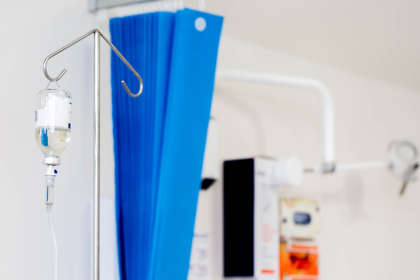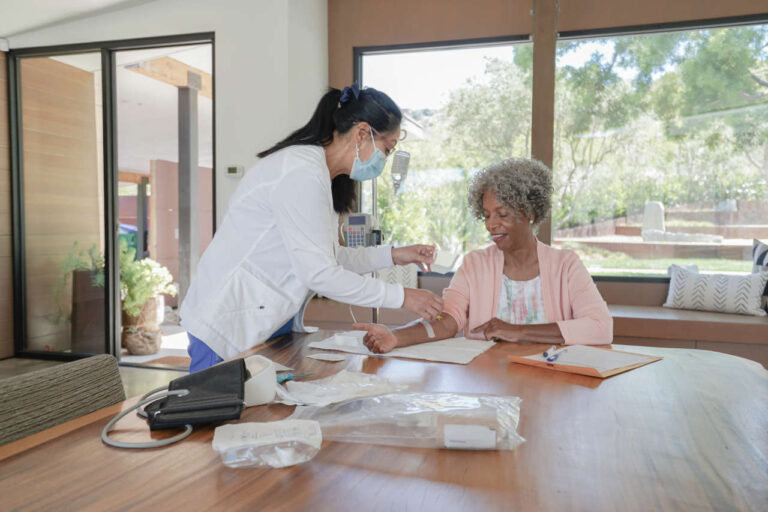
Liệu pháp immunoglobulin tĩnh mạch (IVIG) đã nổi lên như một phương pháp điều trị đầy hứa hẹn cho bệnh viêm cơ, thường được gọi chung là bệnh cơ viêm tự phát (IIM). Viêm cơ là một nhóm bệnh tự miễn hiếm gặp gây viêm mãn tính và yếu cơ. Các triệu chứng của tình trạng suy nhược này có thể xuất hiện dần dần theo thời gian và ảnh hưởng đáng kể đến chất lượng cuộc sống của bệnh nhân.
Nhận hỗ trợ đồng thanh toán IVIG
Nói chuyện với một chuyên giaMỗi năm, khoảng 7.000 người được chẩn đoán mắc bệnh viêm cơ và có hơn 50.000 cá nhân ở Hoa Kỳ sống chung với tình trạng này. Theo thử nghiệm mù đôi và có đối chứng giả dượcLiệu pháp IVIG được chứng minh là có hiệu quả trong việc kiểm soát các triệu chứng của bệnh viêm cơ.
Bài viết này cung cấp hiểu biết toàn diện về bệnh viêm cơ, nguyên nhân gây bệnh, các loại bệnh và liệu pháp immunoglobulin tĩnh mạch (IVIG) có thể mang lại hy vọng và sự giảm đau cho những người mắc phải tình trạng bệnh khó chữa này.
Hiểu về bệnh viêm cơ
Viêm cơ, bắt nguồn từ các từ tiếng Hy Lạp “myo” (cơ) và “itis” (viêm), được dùng chung để chỉ tình trạng viêm cơ mãn tính và tiến triển. Trong tình trạng tự miễn dịch này, hệ thống miễn dịch, vốn có chức năng bảo vệ cơ thể khỏi các tác nhân xâm nhập từ bên ngoài như vi-rút và vi khuẩn, lại tấn công nhầm vào các mô cơ khỏe mạnh, khiến chúng trở nên yếu, đau nhức và mệt mỏi.
Sưng, yếu cơ, đau và phát ban trên da là những triệu chứng phổ biến nhất của bệnh viêm cơ.
Viêm cơ có thể xảy ra ở mọi lứa tuổi, nhưng thường gặp nhất ở người lớn từ 30 đến 60 tuổi.
Nguyên nhân gây viêm cơ là gì?
Nguyên nhân chính xác của bệnh viêm cơ vẫn chưa được biết rõ, nhưng các nhà nghiên cứu tin rằng nó liên quan đến sự kết hợp của các yếu tố di truyền và môi trường. Một số yếu tố rủi ro tiềm ẩn bao gồm:
- Yếu tố kích hoạt di truyền: Một số dấu hiệu di truyền có thể làm tăng khả năng mắc bệnh viêm cơ.
- Rối loạn chức năng hệ thống miễn dịch: Viêm cơ thường được phân loại là một rối loạn tự miễn, trong đó hệ thống miễn dịch vô tình làm tổn thương các mô cơ và gây ra tình trạng yếu cơ.
- Các tác nhân kích hoạt môi trường: Nhiễm trùng như nhiễm trùng do virus hoặc tiếp xúc với một số loại thuốc nhất định (statin) và ma túy bất hợp pháp như cocaine có thể gây ra bệnh viêm cơ ở những người dễ bị tổn thương.
- Chấn thương, sang chấn và ung thư: Chấn thương, sang chấn và ung thư cũng có thể gây ra bệnh viêm cơ do áp lực mà nó gây ra cho cơ thể.
Các loại viêm cơ phổ biến là gì?
Viêm cơ được phân loại thành nhiều phân nhóm dựa trên các đặc điểm, triệu chứng và nguyên nhân tiềm ẩn cụ thể. Phân loại này giúp bác sĩ và chuyên gia chăm sóc sức khỏe chẩn đoán và điều trị bệnh hiệu quả. Các dạng viêm cơ phổ biến nhất bao gồm:
- Viêm đa cơ: Đặc trưng bởi tình trạng viêm nhiều cơ ảnh hưởng đến cả hai bên cơ thể, đặc biệt là vai, hông và cổ.
- Viêm da cơ: Loại này bao gồm phát ban da, có thể là dấu hiệu chẩn đoán quan trọng. Yếu cơ thường phát triển muộn hơn.
- Viêm cơ thể vùi rải rác (sIBM): Đây là dạng viêm cơ tiến triển, thường gặp ở người lớn tuổi, có thể dẫn đến suy nhược cơ nghiêm trọng và khó nuốt.
- Bệnh cơ hoại tử: Bệnh nhân trong nhóm này thường có kết quả sinh thiết cho thấy tình trạng viêm ít hơn so với viêm đa cơ, tuy nhiên, tỷ lệ chết tế bào cao hơn. Giống như viêm đa cơ, nhóm này gây ra tình trạng yếu cơ ở vùng thân mình.
Liệu pháp IVIG: Một phương pháp điều trị viêm cơ đầy hứa hẹn
Mặc dù không có cách chữa khỏi viêm cơ, một số loại thuốc ức chế miễn dịch và corticosteroid thường được kê đơn như phương pháp điều trị đầu tay để kiểm soát các triệu chứng của tình trạng này. Tuy nhiên, trong một số trường hợp, khi corticosteroid và thuốc ức chế miễn dịch tiêu chuẩn không có tác dụng hiệu quả hoặc bị chống chỉ định, immunoglobulin tiêm tĩnh mạch (IVIG) được lựa chọn như một liệu pháp thay thế hoặc điều trị bổ sung.
IVIG là phương pháp điều trị duy nhất được chứng minh là an toàn, hiệu quả và dung nạp tốt trong điều trị nhiều dạng viêm cơ. Liệu pháp này đã cho thấy hiệu quả có lợi trong việc kiểm soát các triệu chứng viêm cơ, điều hòa phản ứng miễn dịch, giảm viêm và ngăn ngừa tổn thương cơ thêm.
IVIG là gì?
IVIG là dung dịch immunoglobulin cô đặc, là kháng thể có nguồn gốc từ huyết tương của người hiến tặng khỏe mạnh. Các immunoglobulin này giúp tăng cường hệ miễn dịch và có thể điều chỉnh phản ứng tự miễn dẫn đến viêm cơ.
Hơn nữa, nhiều nghiên cứu đã chỉ ra rằng IVIG có thể cải thiện sức mạnh cơ, sức bền và chức năng thể chất tổng thể ở những bệnh nhân bị viêm cơ.
Hỏi về dịch truyền IVIG tại nhà
IVIG hoạt động như thế nào?

Cơ chế tác động chính xác mà liệu pháp IVIG mang lại lợi ích cho bệnh nhân viêm cơ vẫn chưa rõ ràng. Tuy nhiên, có một số giả thuyết được đề xuất về việc IVIG có thể mang lại hiệu quả điều trị như sau:
- Điều hòa miễn dịch: IVIG chứa nhiều loại kháng thể khác nhau có khả năng điều hòa hệ miễn dịch. Điều này có thể giúp ngăn chặn phản ứng miễn dịch sai lệch gây tổn thương cơ.
- Trung hòa kháng thể: IVIG có thể chứa kháng thể trung hòa các tự kháng thể có hại do hệ miễn dịch tạo ra. Điều này có thể làm giảm viêm cơ và hạn chế tổn thương cơ thêm.
- Tác dụng chống viêm: IVIG cũng có thể có tác dụng chống viêm trực tiếp, làm giảm tình trạng viêm tổng thể ở cơ.
IVIG có thể được sử dụng để điều trị các loại viêm cơ nào?
IVIG đã được sử dụng như một lựa chọn điều trị cho nhiều loại viêm cơ, bao gồm viêm đa cơ (PM), viêm da cơ (DM), viêm cơ vùi (IBM) và viêm cơ thiếu niên (JM) ít phổ biến hơn. Liệu pháp này không chữa khỏi viêm cơ nhưng có thể giúp giảm bớt các triệu chứng để bệnh nhân có thể sống ít đau đớn hơn.
Liều lượng IVIG tiêu chuẩn cho bệnh nhân viêm cơ là bao nhiêu?
Liều IVIG ban đầu thường được tiêm tĩnh mạch trong 2 đến 5 ngày với liều 2 g/kg. Sau đó, liều duy trì là 1 g/kg mỗi tháng trong vài tháng. Tùy thuộc vào đáp ứng điều trị, IVIG có thể được giảm dần trong vài tháng tiếp theo. Liều IVIG, tốc độ truyền và chu kỳ IVIG được thiết lập tùy theo tình trạng sức khỏe của bệnh nhân và mức độ nghiêm trọng của các triệu chứng viêm cơ.
Có tác dụng phụ nào liên quan đến IVIG không?
Mặc dù điều trị bằng IVIG nhìn chung an toàn và dung nạp tốt, nhưng nó cũng có một số tác dụng phụ tiềm ẩn. Bệnh nhân bị viêm cơ có thể gặp các triệu chứng khó chịu toàn thân, các triệu chứng giống cúm, đau đầu nhẹ, ớn lạnh, sốt và đau khớp. Những tác dụng phụ này thường là tạm thời và sẽ giảm dần trong vòng vài ngày sau khi điều trị.
Hơn nữa, trong một số trường hợp hiếm gặp, một số bệnh nhân có thể gặp phản ứng truyền dịch, gây ra các triệu chứng nổi mề đay, khó thở, hoặc thậm chí là phản ứng dị ứng nghiêm trọng (sốc phản vệ). Thông thường, để giảm thiểu phản ứng truyền dịch tiềm ẩn, bác sĩ sẽ kê đơn Benadryl và Tylenol trước khi truyền. Phản ứng truyền dịch thường xảy ra ở những bệnh nhân thiếu hụt IgA. Do đó, nên kiểm tra tình trạng thiếu hụt IgA ở bệnh nhân viêm cơ trước khi bắt đầu điều trị bằng IVIG.
Tỷ lệ thành công của IVIG trong điều trị viêm cơ là bao nhiêu?
Tỷ lệ thành công của IVIG trong điều trị viêm cơ có thể khác nhau tùy thuộc vào một số yếu tố, bao gồm loại viêm cơ cụ thể, phản ứng của từng bệnh nhân với phương pháp điều trị và mức độ nghiêm trọng của bệnh.
Ví dụ, một thử nghiệm có đối chứng ngẫu nhiên được công bố trong Tạp chí Y khoa New England đã chứng minh rằng IVIG có hiệu quả trong điều trị bệnh nhân viêm da cơ, một dạng viêm cơ đặc hiệu. Nghiên cứu cho thấy những bệnh nhân được truyền IVIG có sức mạnh cơ bắp được cải thiện đáng kể và nồng độ enzyme cơ giảm, cho thấy tình trạng viêm cơ giảm.
Tương tự như vậy, một cái khác họcKết quả nghiên cứu cho thấy phương pháp điều trị IVIG dài hạn có hiệu quả trong việc cải thiện sức mạnh cơ và duy trì khả năng đi lại ở bệnh nhân sIBM.
Tiêm IVIG để điều trị viêm cơ thường xuyên như thế nào?
Tần suất và liều lượng điều trị IVIG thay đổi tùy thuộc vào mức độ nghiêm trọng của viêm cơ và đáp ứng điều trị của bệnh nhân. Một số người có thể cần truyền IVIG hàng tháng, trong khi những người khác có thể được truyền cách quãng dài hơn.
IVIG có thể giúp ích gì?
Thông tin điều trị IVIG miễn phíPhần kết luận
Tóm lại, viêm cơ là một tình trạng khó điều trị, có thể ảnh hưởng đáng kể đến chất lượng cuộc sống của người bệnh. Tuy nhiên, với những tiến bộ trong y học, các phương pháp điều trị như IVIG mang lại hy vọng cho bệnh nhân viêm cơ. Bằng cách điều chỉnh phản ứng miễn dịch và giảm viêm cơ, liệu pháp IVIG có thể giúp giảm triệu chứng và cải thiện các triệu chứng liên quan đến viêm cơ.
TÀI LIỆU THAM KHẢO:
- Patwardhan, A. (2020). Giá trị của liệu pháp immunoglobulin tĩnh mạch trong điều trị viêm cơ vô căn trong kỷ nguyên chuyển đổi sinh học hiện nay. Cureus, 12(2). https://doi.org/10.7759/cureus.7049
- Glaubitz, S., Zeng, R., & Schmidt, J. (2020). Những hiểu biết mới về điều trị viêm cơ. Tiến bộ điều trị bệnh cơ xương khớp, 12. https://doi.org/10.1177/1759720X19886494
- Cheeti, A. (25 tháng 5 năm 2023). Bệnh cơ tự miễn. StatPearls – Kệ sách NCBI. https://www.ncbi.nlm.nih.gov/books/NBK532860/
- Nhà xuất bản Viện Hàn lâm Quốc gia (Hoa Kỳ). (24 tháng 5 năm 2022). Viêm cơ. Các rối loạn miễn dịch và khuyết tật được chọn lọc – Kệ sách NCBI. https://www.ncbi.nlm.nih.gov/books/NBK584479/
- Viêm cơ: viêm cơ | Bệnh cơ viêm | HSS. (nd). Bệnh viện Phẫu thuật Đặc biệt. https://www.hss.edu/condition-list_myositis.asp#treatment
- Patel, JH, Duggal, L., Chaturvedi, V., Jain, N., Bhandari, G., & Gupta, M. (2020). Globulin miễn dịch tiêm tĩnh mạch trong điều trị viêm cơ vô căn: Tổng quan hồi cứu tại một trung tâm. Tạp chí thấp khớp Ấn Độ. https://doi.org/10.4103/injr.injr_28_20
- Dalakas, MC Lợi ích lâm sàng và mối tương quan miễn dịch bệnh lý của globulin miễn dịch tiêm tĩnh mạch trong điều trị bệnh cơ viêm. Miễn dịch học lâm sàng và thực nghiệm, 104, 55-60. https://doi.org/10.1111/cei.1996.104.s1.55
- Ohad, M., Shemer, A., Lavie, I., Ozeri, D., Shoenfeld, Y., & Kivity, S. (2020). Globulin miễn dịch tiêm tĩnh mạch cho bệnh viêm cơ. Jcr-tạp chí thấp khớp lâm sàng, 27(8), e616–e621. https://doi.org/10.1097/rhu.0000000000001418
- Aggarwal, R., Charles-Schoeman, C., Schessl, J., Bata-Csörgő, Z., Dimachkie, MM, Griger, Z., Moiseev, SA, Oddis, CV, Schiopu, E., Vencovský, J., Beckmann, I., Clodi, E., Bugrova, O., Dankó, K., Ernste, FC, Goyal, N., Heuer, M., Hudson, M., Hussain, Y., . . . Levine, T. (2022). Thử nghiệm globulin miễn dịch tiêm tĩnh mạch trong bệnh viêm da cơ. Tạp chí Y khoa New England, 387(14), 1264–1278. https://doi.org/10.1056/nejmoa211791













